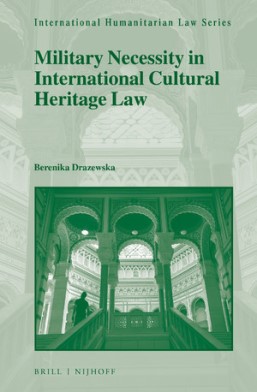
This book offers the first comprehensive scholarly analysis of the current meaning and scope of military necessity – a key concept in the international legal framework for the protection of cultural heritage during armed conflicts since the adoption of the 1954 Hague Convention. Academic discussions commonly view military necessity uniquely through the lens of international humanitarian or international criminal law. In her book, Berenika Drazewska presents a more comprehensive perspective, examining developments across various strands of international law arisen since 1954. This novel approach demonstrates how international cultural heritage law affords a particularly strict meaning to military necessity. As a result, the relative waiver will only be available to belligerents very rarely, in truly extraordinary circumstances.
Drazewska’s Military Necessity in International Cultural Heritage Law engages a significant issue in this rapidly evolving field of international law, the inclusion of necessity in regulation of the protection of cultural heritage during armed conflict after 1945. Its very inclusion was viewed as a major concession, which is only multiplied because of the difficulties of its application on the ground. This thorny issue has come to the fore again with large-scale cultural losses inflicted during recent armed conflicts. Elegantly written and scholarly in its approach, this book places this question and possible answers to it within the broader sweep of international law and recent developments not only in international humanitarian law, but state responsibility, international criminal law and international criminal law. It offers a significant and timely reexamination and reconceptualization of this important topic.